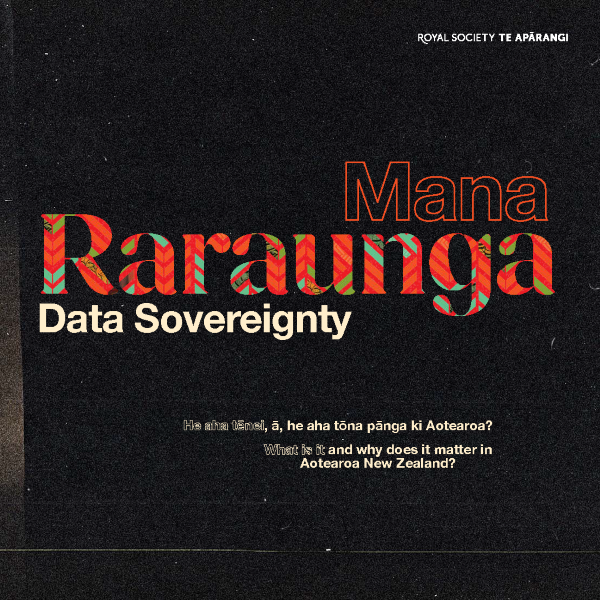Mana Raraunga Data Sovereignty

2023: This report outlines what data sovereignty is and why it matters in Aotearoa New Zealand. It gives an overview of the concepts of data sovereignty, Indigenous data sovereignty, and Māori data sovereignty. These concepts are helping guide answers to complex questions about who owns, controls, and protects our data. The report also describes new data practices that are emerging to create a data future that benefits us all.
View Mana Raraunga Data Sovereignty
Mana Raraunga Data Sovereignty summary
Data flows around the world, silently making decisions that affect all of us, all the time.
—Andrew Chen, 2020 (1)
In this digital era, individuals, groups, and governments are continously generating enormous amounts of data that are used to make decisions, drive innovation, and make profits. Data has become hugely valuable and a source of power.
But who owns, controls, and protects our data? The concepts of data sovereignty, Indigenous data sovereignty, and Māori data sovereignty are helping guide answers to such complex questions.
Data are the single most significant asset shaping our present and future realities.
—Kiri West et al, 2020 (2)
This report gives an overview of these concepts and the new data practices that are emerging to ensure a data future that supports the wellbeing of us all.
Typically, data sovereignty is the concept that if data is stored in a country, then the rules of that country apply to it. More broadly, data sovereignty relates to individuals, particular groups, and nations having ownership over and the ability to control their own data as they see fit.
Indigenous data sovereignty states that data is subject to the laws of the nation from which it is collected. It recognises that Indigenous Peoples have inherent rights and responsibilities to Indigenous data.
Māori data sovereignty refers to the rights Māori have to data that relates to Māori.
There is no one definition of data sovereignty, but issues of control and power over data at the individual, collective or nation level predominate.
—Katharina Ruckstuhl, 2023 (3)
These concepts address the rights of individuals, collectives, and Nation States to manage their own data in ways that align with their laws, values, practices, and customs.
Harms are being caused to individuals and groups by insufficient governance of digital technologies. Technology and its uses are changing, and law, regulation, and policy need to keep up. Through better understanding of data issues, there can be more conversations and better decisions about the way data is defined, collected, stored, used, and protected for the social and economic benefit of Aotearoa New Zealand communities.
Good data practices are important so individuals and groups are not harmed and data contributes to improving people’s quality of life.
—Tahu Kukutai et al, 2023 (4)
For Indigenous Peoples, data sovereignty connects closely with rights and autonomy. In Aotearoa New Zealand, Māori data sovereignty is influencing how Māori data is governed. New models and frameworks are supporting Māori aspirations to control Māori data to advance Māori self-determination and wellbeing. In this era of open data and big data, Indigenous data sovereignty and Māori data sovereignty are providing alternative data systems and structures that confront the data challenges facing all communities.
Māori have age-old systems and protocols around the protection and sharing of collective knowledge and are well positioned to reimagine tikanga for technology in a digital age.
—Tahu Kukutai et al, 2020 (5)
The data sovereignty world is one where there are more questions than answers. Data sovereignty, Indigenous data sovereignty, and Māori data sovereignty offer pathways to data being used for good, for collective benefit, and for positive system change. The data future is not fixed: the decisions we make now will help shape an equitable, people-centred digital future.
Contact us
For any enquiries on this report, please contact expertadvice@royalsociety.org.nz
To cite:
Royal Society Te Apārangi. Mana Raraunga Data Sovereignty. Royal Society of New Zealand Te Apārangi. 2023. https://www.royalsociety.org.nz/assets/Mana-Raraunga-Data-Sovereignty-web-V1.pdf
- Chen A. Introduction: Zeros and ones, off and on. In: Shouting Zeros and Ones: Digital Technology, Ethics and Policy in New Zealand. Wellington, New Zealand: Bridget Williams Books; 2020.
- West K, Wilson D, Thompson A, Hudson M. Māori Perspectives on Trust and Automated Decision-Making. Report for the Digital Council; 2020.
- Ruckstuhl K. Data as taonga: Aotearoa New Zealand, Māori data sovereignty and implications for protection of treasures. NYU Journal of Intellectual Property & Entertainment Law. 2023;12(3). https://jipel.law.nyu.edu/data-as-taonga-aotearoa-new-zealand-maori-datasovereignty-and-implications-for-protection-of-treasures/.
- Kukutai T, Campbell-Kamariera K, Mead A, Mikaere K, Moses C, Whitehead J, et al. Māori data governance model. Te Kāhui Raraunga;2023 May. https://www.kahuiraraunga.io/_files/ugd/b8e45c_a5b7af8b688c4cd9b7583775c27da52e.pdf [Accessed 1st June 2023].
- Kukutai T, Carroll SR, Walter M. Indigenous data sovereignty. In: Mamo D (ed.) The Indigenous World 2020. Copenhagen, Denmark: The International Work Group for Indigenous Affairs (IWGIA); 2022. p. 654–662. https://www.iwgia.org/en/resources/indigenous-world[Accessed 12th January 2023].
Tahu Kukutai FRSNZ
Leading data sovereignty expert
This report from Royal Society Te Apārangi provides a timely overview of data sovereignty and why it is important. It is pleasing to see recognition of the huge contribution that Māori and Indigenous scholars and communities are making to theory and practice. Their innovative thinking and profoundly different way of thinking about data, and the risks and opportunities, is not only good for Māori but good for Aotearoa as we all grapple with the future implications of AI and other data-driven technologies
